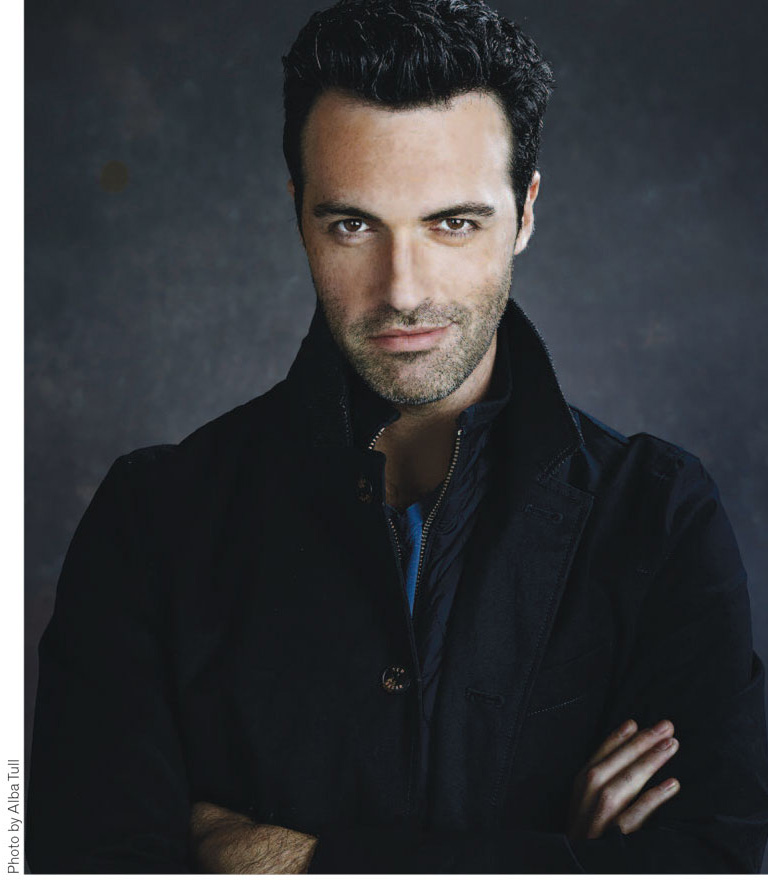Has anyone portrayed a conniving Washington insider better than Reid Scott in HBO’s political comedy Veep? His character, Dan Egan, can never quite tell whether he’s living the dream or trapped in a nightmare, but he never seems to take it personally. It’s all part of clawing your way to the top in D.C. Reid is part of a brilliant ensemble cast that has won more than two dozen awards, including multiple Emmys. You’ll be seeing a lot more of Reid in 2017–18. He co-stars this fall with Reese Witherspoon in the romantic comedy Home Again. Season Seven of Veep is slated to premier in the spring of 2018. Mark Stewart caught up with Reid in Paris, where he is shooting another rom-com with Veep co-star Matt Walsh entitled Under the Eiffel Tower.
EDGE: Whenever I see a unique character—especially one that makes me laugh and cringe at the same time—I’m curious how that character evolved. Tell me about the evolution of Dan Egan.
RS: When I first read for the part, like so many characters, in the beginning it was almost a caricature or sketch of a character. That’s what drew me to this show in the first place, Armando Ianucci, the show’s creator, really wanted the actors to fill in these characters. It came through in rehearsals, when we improv’d, that we would become the custodians of these characters. Dan is charming and conniving, your typical D.C. former frat boy political wonk.
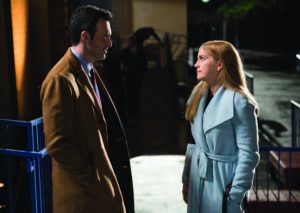
Courtesy of HBO
EDGE: How do you research that type of role?
RS: Over the years, because I’ve had this incredible access to people in D.C., I’ve added nuance to Dan that’s sort of an amalgamation of all these people. I have a close buddy, Jay Carson, who was a consultant on House of Cards and a real-life mover and shaker on the Hill. I sent him the first script and said, “Tell me everything.” He wrote me back, “Oh, my God, you’re practically playing me!” I’m not playing Jay, but he definitely helped me add all the ticks to Dan, who is like so many wonderfully horrible people in D.C.
EDGE: Do you ever channel the Communications students you met as a student at Syracuse University?
RS: It’s a huge school and I was always underground in an editing bay or rehearsing something on stage. I didn’t co-mingle with any Communications guys. I did do research on the world of broadcast journalism for Dan and that was really, really helpful.
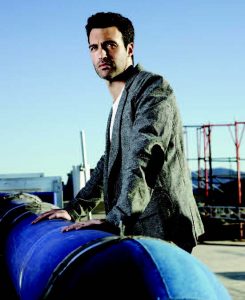
Photo by Alba Tull
EDGE: What was your major there?
RS: I ended up making my own major at Syracuse. I was in the Film department but I didn’t have a whole lot of access to actors because of the way the campus is set up. Syracuse Stage is a very reputable regional theater. The Theater department is located downtown, where that stage is. I was making my crappy little films and my teacher suggested that if I really wanted to know what it is I was asking of my actors, I should do it myself. So I started taking acting classes and learned their weird little language—what actors do and how to communicate with them. Which was amazing. I did a couple of black-box plays, things like that. I was terrible, but I loved the thrill of the live audience. I don’t know that I ever turned off my director’s brain, and I’m sure I drove my directors crazy. But in the end, I graduated with a degree in Directing, which wasn’t offered to undergrads at that time. Now it is, and I’m proud to have been the first.
EDGE: Usually in a TV series, a character has a particular trajectory. But in Veep, Dan is up, down, sideways, all over the place. Is there a challenge in inhabiting a character like that, or do you just sit back and see what the writers come up with next?
RS: It’s a little bit of both. Like, in Season Two, the writers said, “Dan’s going to be really bored.” I thought, crap, I don’t know how to do “really bored.” But slowly it came to light that he’s gunning for a position and eventually he became campaign manager. So they give you little hints as to what’s going to happen. The writers are truly inclusive about sharing information with us. From the beginning, Dan Egan was a guy—and he still is—a guy who to some degree is always shooting for the top. But they discovered it was much funnier for him to have him almost reach that top rung and then fall… [Laughs] almost as many times as I have!
EDGE: Dan is most entertaining when he has a foil, and you’ve had some good ones on Veep. Which character brings out the best in you and the worst in Dan?
RS: I’ve been lucky—in that Dan’s been lucky—to have great adversarial characters. Obviously, Jonah Ryan is the best. I love playing opposite Tim Simons so much. Not only are we good friends, but we slip in and out of those characters so easily now that we waste no time pussy-footing around it. We just get right into it. It’s such fun.
EDGE: How much of what we see on-screen is scripted versus improvisation?
RS: Honestly? It’s kind of right down the middle. The writers write very well thought-out, tight scripts. But because we’ve been inhabiting these people so long, they really trust us and encourage us to fill in the blanks. We have a long rehearsal process so we may have weeks with the script before we get in front of the camera. During that time, the writers may go back and re-write the scripts to incorporate our improvs. But by the time we get there, there’s a really wonderful framework. When we’re shooting, we’re shooting it as written, but we’ve had a hand in that. Then, of course, the day we are shooting, they say, “Take the leash off and do what you guys do.”
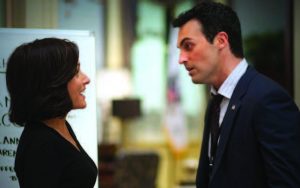
Courtesy of HBO
That’s what makes the show seem so natural, when we use the script as a roadmap and they choose the best takes in editing.
EDGE: The key to your character, I think, is that he is both relentless and just relentlessly self-absorbed.
RS: Oh, yeah. Dan is very into himself. He’s always got to climb. It’s always about him. Even when he’s serving someone else, he’ll serve them to the death…[Laughs] but that’s because it’s the other person’s death, not his.
EDGE: You’ve been a member of ensemble casts before. What makes this one work so well?
RS: We have a very large cast, which is unusual in and of itself. The fact that everyone gets along, even on a social level, that’s pretty amazing in Hollywood. We all really do. We’ve gone on vacations together! On this show the “family” has become a real family. Also, it’s unique that we all share the same sensibility. We just run with each other now, like a well-oiled machine. We’ll give each other little signals when we’re improv-ing. We know how to “dance” with each other.
EDGE: How does that happen?
RS: It feels like lightning striking. I’ve really got to credit our show runners and writers. They did an amazing job in casting. I don’t mean to sound self-serving but they found people who really worked well together. A lot of people don’t care about that—they just want the star, the famous name or face or whatever. But here they got actors who could really do this job, including the guest stars. It’s always great to see them parachute in for an episode or two and say, “What’s happening here? You guys are, like, speaking your own language.” And we wouldn’t want to work any other way.
EDGE: And yet, on camera, all the characters are slitting each other’s throats.
RS: Oh, totally. Everyone is out for themselves. They’re horrible and reprehensible.
EDGE: Your previous series, My Boys on TBS, had a pretty impressive cast, including Jim Gaffigan. Did you have a good comfort level with those actors over its four-season run?
RS: Yes, in fact that was the first thing that happened. During the tests for that show, we kind of sniffed each other out immediately. There were a dozen or so actors in there, all really wanting this job with this great, fun script. You could look around the room and almost tell who was going to make the cut. We instantly all gelled and bonded, and that’s because Betsy Thomas, the show’s creator, was like, “Get over to my house—we’ll play poker and get drunk together.”
EDGE: There seemed to be a fair amount of improvisation on that show, too.
RS: We did do a lot of improvisation on that show, which didn’t get talked about a lot. And that was really my first foray into improv. They’d do long takes and just let us go and go and go. It was wonderful, but I was terrified. I had taken some classes so I was familiar with how to improvise—I sort of wanted it in my quiver—but I hadn’t done it professionally. When I got around Mike Bunin, Jim Gaffigan and Jamie Kaler, who are incredible improvisers, it was an education. I learned on the job. At first, I was very uncomfortable, but by the end of Season Four I was, like, “Man this is what’s fun, this is real performance for me, letting go and having it come from yourself.” So that was the training that set me up to hang in with people like Julia Louis-Dreyfuss (above, left) and Matt Walsh. They were idols to me. It if weren’t for all that time on My Boys, I don’t think I would have been as comfortable on Veep.
EDGE: Julia Louis-Dreyfus and Jim Gaffigan (right, center) are old pros when it comes to performing in front of live audiences. What do you think they brought over to their roles on the filmed shows?
RS: Jim’s strength is that, right in the moment, he knows what’s funny. You always want to follow his lead. If he had a suggestion to make something funnier, maybe not so on-the-nose, we took it, and it was great. Julia is the same way but, like, on a gallon of steroids. She works so hard. I’ve never seen anybody who constantly works to make everything and everybody around her better—whether it’s tearing the script up and starting from scratch or finding those little funny moments. Julia has a tremendous work ethic and she’s also incredibly funny. It just comes naturally to her. Jim is more of a craftsman. He knows how to bury a joke in there, then tease it out in just the right way and deliver it. That’s what he does as a stand-up. Julia works the scene, she works the whole script. So on My Boys and Veep, I’ve basically had two masters courses in comedy.
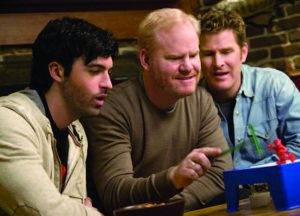
Sony Pictures Television/TBS
EDGE: You also played Dr. Todd on The Big C opposite Laura Linney. There was nothing comedic about that role.
RS: No, that was just the opposite. But again, I was very lucky. Laura is a lot like Julia, only on the dramatic side. She’s a workaholic. She breaks down every single moment, doesn’t rush things, plays things small. It’s amazing how comfortable she is. I learned so much from her. Laura is always willing to try something new, something different. On top of that, she is such a professional.
EDGE: In what ways?
RS: I mean, she knew everyone’s lines. Perfectly. There was a scene in Dr. Todd’s office where she’s crying because the cancer is progressing. She nailed it every single take, brought that raw emotion every single time. Meanwhile, I needed a couple of takes to get it right and I said, “I feel bad that I’ve been putting you through the wringer.” She said, “No. This is what we do.” For me it was like a lightbulb going off. You bring 100 percent every time—for your partner, for yourself, for the show.
Editor’s Note: The past few years, Reid Scott has made the most of his hiatus time from Veep. In addition to this year’s Home Again with Reese Witherspoon and Pico Alexander (above), he has co-starred with Kevin Kline in Dean and Jessica Alba in The Veil. He also played opposite Blythe Danner in I’ll See You In My Dreams.

